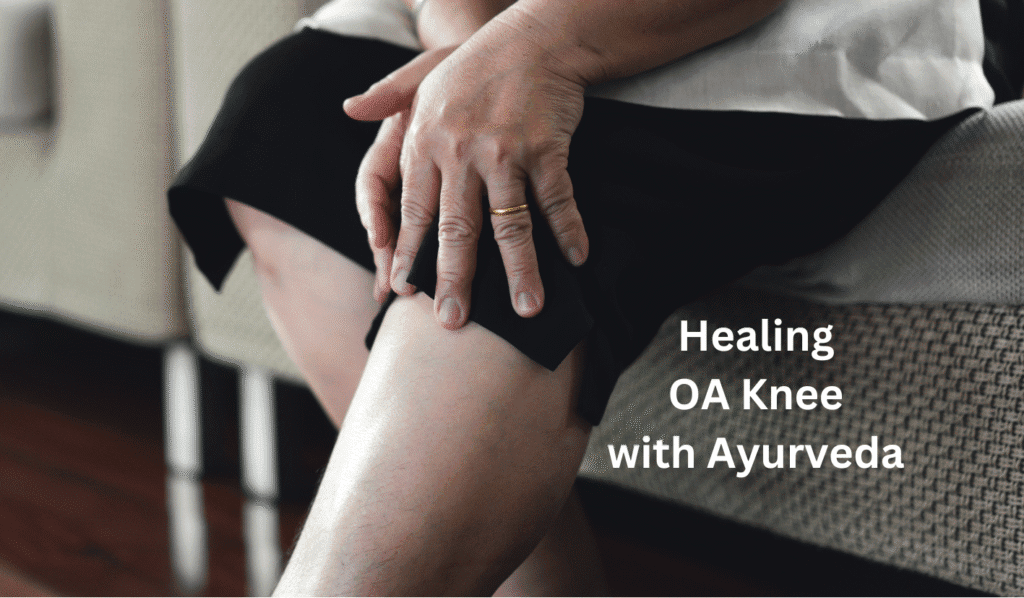Osteoarthritis (OA) is a degenerative joint condition, most commonly affecting the knees, and is a leading cause of pain, disability, and reduced quality of life among individuals, especially as they age. While modern medicine offers treatments like pain relief medications, injections, and even knee replacement surgery, Ayurveda provides a more natural, sustainable, and holistic approach to managing OA. At Shantitheeram Ayurveda, a renowned authentic Ayurveda and Panchakarma centre in Alappuzha (Alleppey), Kerala, India, we offer time-tested Ayurvedic treatments for osteoarthritis, focusing not only on relieving pain but also addressing the root causes of the condition.
Understanding Osteoarthritis in Ayurveda
In Ayurveda, osteoarthritis is commonly associated with Sandhivata, which occurs due to an imbalance in the Vata dosha. Vata, one of the three fundamental doshas (Vata, Pitta, and Kapha), governs movement and dry qualities in the body. When Vata becomes aggravated, it can lead to the degeneration of tissues, including the cartilage in the joints, causing pain, stiffness, and restricted movement.
The primary causes of OA in Ayurvedic terms include improper diet, an unhealthy lifestyle, lack of proper physical activity, aging, and mental stress. These factors disturb the Vata dosha, leading to the drying up of synovial fluid (which lubricates the joints) and the weakening of the bones, muscles, and cartilage.
Ayurvedic Treatment Approaches for Knee Osteoarthritis at Shantitheeram Ayurveda
At Shantitheeram Ayurveda, we provide a comprehensive and personalized treatment plan for knee osteoarthritis based on the patient’s individual constitution (Prakriti), the severity of the condition, and the underlying dosha imbalances. Our treatment modalities combine a range of therapies that aim to pacify aggravated Vata, reduce inflammation, enhance joint lubrication, strengthen tissues, and improve mobility.
Here’s an overview of how Ayurvedic treatment for knee osteoarthritis is approached at Shantitheeram Ayurveda Wellness Retreat in Kerala:
1. Panchakarma Therapies for Detoxification and Rejuvenation
Panchakarma is the cornerstone of Ayurvedic healing, and it plays a crucial role in treating osteoarthritis by detoxifying the body and restoring the balance of the doshas. Our Panchakarma therapies for OA include:
a. Abhyanga (Full Body Oil Massage) A gentle yet profound oil massage using medicated herbal oils, Abhyanga is designed to pacify Vata dosha and nourish the tissues. It improves blood circulation, reduces stiffness in the joints, and enhances mobility. The oils used in Abhyanga are chosen specifically to lubricate the joints and alleviate pain and discomfort.
b. Swedana (Herbal Steam Therapy) Following Abhyanga, Swedana or herbal steam therapy helps open up the channels of the body, promoting the elimination of toxins. It helps reduce inflammation and stiffness in the joints, making it easier for patients to move their knees with less discomfort.
c. Basti (Medicated Enema) Basti is a highly effective Panchakarma procedure for treating osteoarthritis, especially when it is caused by aggravated Vata. Medicated oils or herbal decoctions are administered through the rectum, which not only helps in lubricating the joints but also cleanses the colon, improving Vata balance. This treatment is deeply nourishing and rejuvenating for the body, promoting long-term relief from OA symptoms.
d. Pizhichil (Oil Bath) Pizhichil is a therapeutic oil bath where warm medicated oil is poured continuously over the body while being massaged. This therapy is excellent for conditions like OA as it strengthens the muscles and joints, reduces pain, and enhances mobility. Pizhichil is also deeply relaxing and helps calm the mind, reducing stress, which can exacerbate symptoms of OA.
e. Janu Basti Janu Basti is a local treatment specifically targeted for the knees. In this therapy, a reservoir is built around the knee joint, and warm medicated oil is retained in it for a specific period. Janu Basti provides immediate relief from knee pain, lubricates the joint, and helps in restoring mobility by nourishing the cartilage and surrounding tissues.
2. Herbal Medicines and Formulations
Herbal medications play an integral role in the Ayurvedic management of osteoarthritis. At Shantitheeram, our expert Ayurvedic doctors prescribe specific herbs and formulations tailored to the individual’s condition. Some of the commonly used herbs and formulations include:
a. Shallaki (Boswellia serrata) Shallaki is well-known for its anti-inflammatory properties, and it helps reduce pain and swelling in the joints. It is often used in Ayurvedic medicine to improve joint flexibility and mobility.
b. Guggulu (Commiphora mukul) Guggulu is another potent anti-inflammatory herb that helps in reducing joint pain and improving mobility. It is also known for its ability to support joint health by reducing degeneration of the cartilage.
c. Ashwagandha (Withania somnifera) Ashwagandha is an adaptogen that helps strengthen the body’s response to stress and supports overall vitality. In osteoarthritis, Ashwagandha helps improve strength, reduce inflammation, and alleviate pain, particularly in chronic cases.
d. Nirgundi (Vitex negundo) Nirgundi is often used in external applications as an oil or paste to relieve joint pain and inflammation. It provides immediate relief from stiffness and swelling in the affected area.
e. Triphala Triphala, a combination of three fruits (Amalaki, Bibhitaki, and Haritaki), is a powerful detoxifying agent. It supports digestion and elimination, ensuring that toxins (Ama) do not accumulate in the joints and aggravate osteoarthritis.
f. Rasnasaptakam Kashayam This Ayurvedic decoction is highly beneficial in reducing inflammation and pain in osteoarthritis. It is often prescribed as part of the daily regimen to support joint health and mobility.
3. Dietary Recommendations (Pathya-Apathya)
In Ayurveda, diet plays a critical role in managing osteoarthritis by supporting Vata balance and reducing inflammation. At Shantitheeram Ayurveda, we provide customized dietary plans to our patients that include foods that pacify Vata dosha and nourish the joints.
a. Favor Warm, Cooked Foods Cold and raw foods can aggravate Vata dosha, so we recommend warm, nourishing meals such as soups, stews, and khichdi (a mix of rice and lentils). These foods are easy to digest and help in balancing Vata.
b. Incorporate Healthy Fats Good fats like ghee, sesame oil, and flaxseed oil are encouraged as they help lubricate the joints and reduce dryness caused by aggravated Vata.
c. Include Anti-inflammatory Spices Spices like turmeric, ginger, and cumin have anti-inflammatory properties and should be included in the daily diet. These spices not only reduce inflammation but also improve digestion, helping the body to better absorb nutrients.
d. Avoid Vata-aggravating Foods Dry, cold, and processed foods should be avoided as they can increase Vata imbalance and exacerbate osteoarthritis symptoms. Foods like crackers, cold salads, and carbonated drinks are best limited.
4. Lifestyle Recommendations (Dinacharya)
Ayurveda emphasizes the importance of lifestyle modifications to maintain dosha balance and manage chronic conditions like osteoarthritis. At Shantitheeram, we guide our patients on following a daily routine that helps manage their condition.
a. Regular Gentle Exercise Gentle exercises like yoga, stretching, and walking are recommended to maintain joint mobility and flexibility. Low-impact yoga asanas such as Vrikshasana (Tree Pose), Trikonasana (Triangle Pose), and Bhujangasana (Cobra Pose) help strengthen the knee joints and improve circulation.
b. Stress Management Stress can aggravate Vata dosha and worsen osteoarthritis symptoms. Practices like meditation, pranayama (breathing exercises), and mindfulness are integrated into the treatment plan at Shantitheeram to help patients manage stress.
c. Adequate Rest Rest is crucial for healing. Patients are encouraged to get sufficient sleep and avoid overexerting the affected knee joints. Following a regular sleep routine helps in balancing Vata and promoting overall well-being.
5. External Applications and Home Remedies
We also suggest simple home remedies that can be practiced alongside professional treatments to manage OA symptoms. These include applying warm compresses, herbal poultices, or oils like sesame oil to the affected area to reduce pain and stiffness.
6. Long-term Benefits of Ayurvedic Treatment for Osteoarthritis
Ayurveda doesn’t just focus on symptom relief but aims at addressing the root cause of osteoarthritis and preventing further degeneration. Through the combination of therapies, herbal medicines, diet, and lifestyle changes, patients can experience significant long-term benefits, such as:
- Pain Relief: Effective reduction in joint pain and stiffness.
- Improved Mobility: Enhanced flexibility and mobility of the knees.
- Reduced Inflammation: Lowered joint swelling and inflammation.
- Slowed Degeneration: Prevention of further cartilage degeneration through nourishment and rejuvenation.
- Holistic Well-being: Improved overall health, including mental and emotional well-being.
Why Choose Shantitheeram Ayurveda for Osteoarthritis Treatment?
At Shantitheeram Ayurveda Panchakarma Retreat in Kerala, we provide authentic Ayurvedic care tailored to each individual. Our experienced Ayurvedic doctors and therapists use a holistic approach, combining personalized treatments, genuine herbal remedies, and supportive therapies to address both the symptoms and the underlying causes of osteoarthritis.
Our serene location in Alappuzha (Alleppey), Kerala — known for some of the best Ayurveda resorts in India — offers the perfect environment for healing and rejuvenation, allowing patients to focus fully on their recovery and well-being. Whether you’re seeking relief from chronic knee pain or looking for a preventive approach to maintain joint health, Shantitheeram Ayurveda is committed to offering the best Ayurvedic treatment for osteoarthritis.
In conclusion, Ayurveda offers a natural, holistic, and highly effective treatment for managing osteoarthritis of the knee. By addressing the root causes, pacifying aggravated Vata, and supporting overall well-being, Ayurveda provides long-lasting relief from pain and helps improve the quality of life for those suffering from OA. At Shantitheeram Ayurveda, our personalized treatments ensure that every guest receives the best care and the maximum benefit from their wellness journey.

